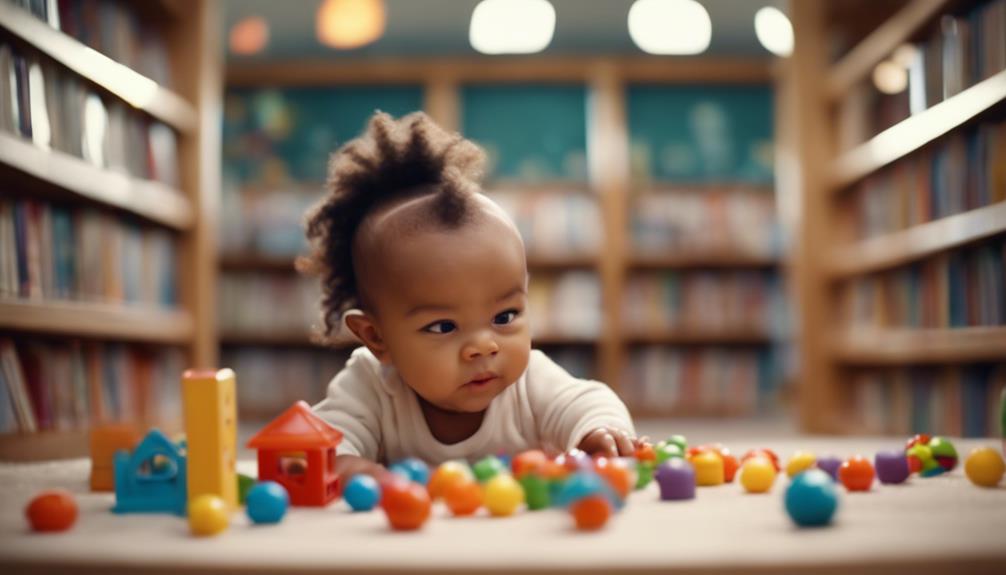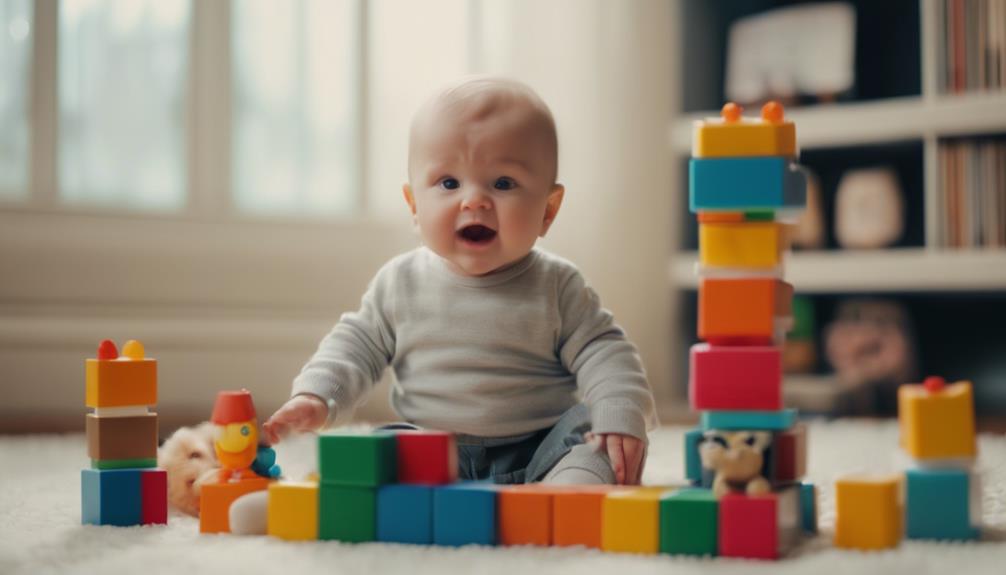To determine if your baby is advanced, pay attention to their alertness, motor skills, language abilities, memory retention, problem-solving, social interactions, and creativity. Keep an eye out for quick bonding, early crawling, advanced language skills, and exceptional memory recall. Look for problem-solving skills, emotional intelligence, and imaginative play. If you notice these signs, your baby may be displaying advanced development. It’s important to remember that there are numerous factors to consider when assessing your baby’s progress.
Key Takeaways
- Look for quick bonding, heightened attentiveness, and early cognitive milestones.
- Track motor skills progress like early crawling and fine motor coordination.
- Pay attention to advanced language skills, like forming sentences early.
- Note exceptional memory retention, quick recall, and strong problem-solving skills.
- Observe intense emotions, emotional intelligence, and advanced creative thinking.
Signs of Exceptional Alertness
Recognizing signs of exceptional alertness in your baby can provide valuable insights into their cognitive and emotional development. Highly intelligent and emotionally gifted babies may exhibit early signs of advanced alertness by bonding quickly with family members and displaying a heightened level of attentiveness. These babies often show a strong recognition of faces and respond promptly to familiar stimuli, reaching cognitive milestones ahead of their peers.
To nurture their alertness, it's essential to observe and understand their unique needs and preferences.
Creating a calm and secure sleeping environment can further enhance their cognitive development. Utilizing white noise and establishing bedtime routines can aid in promoting better sleep patterns for these alert babies. By addressing environmental factors that may disrupt their alertness, you're contributing to their overall well-being and fostering their early cognitive growth.
Stay attentive to the signs of exceptional alertness in your baby, as they offer valuable insights into their early development and potential for future success.
Advanced Motor Skills Development

Gifted children often show early crawling milestones, demonstrating fine motor coordination and developing hand-eye coordination skills at a rapid pace. These advanced motor skills, such as turning book pages or walking on tiptoes, can be early indicators of giftedness in babies and toddlers.
Early Crawling Milestones
By noticing early crawling milestones, you can gain insight into your baby's advanced motor skills development. Gifted children often exhibit accelerated development, with some starting to crawl as early as 6-7 months. These early crawling milestones in infants can signify rapid physical growth and enhanced coordination.
Advanced motor skills demonstrated during early crawling may indicate heightened physical capabilities in your baby. Parents play a significant role in tracking their child's crawling progress to identify potential signs of giftedness and advanced motor skills. Observing how your baby navigates this developmental stage can help you recognize any exceptional motor skills they may possess.
Keep an eye out for early crawling achievements as they can offer valuable information about your baby's physical abilities and overall development. By paying attention to these milestones, you can better understand and support your baby's advanced motor skills journey.
Fine Motor Coordination
Tracking your baby's fine motor coordination can provide valuable insights into their advanced motor skills development.
Gifted children often display advanced fine motor skills at an early age, such as playing with rattles and holding objects adaptively. These skills may include the adaptive use of tools like crayons and paper folding, showcasing their rapid progression in fine motor development.
By observing activities like holding crayons adaptively and drawing recognizable shapes, you can track your child's fine motor skills development. Encouraging activities that involve fine motor skills, such as drawing and coloring, can help nurture giftedness in toddlers.
Paying attention to these signs and providing opportunities for your child to engage in fine motor activities can support their advanced development in this area. By fostering their fine motor skills, you're aiding in their overall growth and potentially enhancing their gifted abilities.
Hand-Eye Coordination Skills
Observing how well your baby coordinates hand movements with visual input can indicate advanced development in motor skills. Gifted children often display advanced hand-eye coordination skills, such as catching a ball at 30 months and using utensils independently by 16.2 months.
Early signs of advanced motor skills can be seen when babies stack blocks around 15 months and manipulate small objects with precision by 18 months. GERRIC charts offer benchmarks for identifying advanced hand-eye coordination skills in gifted children compared to typical milestones.
To nurture your baby's skills in this area, engage in activities like puzzles and threading beads that enhance hand-eye coordination. By providing opportunities for your baby to practice and improve these skills, you can support their overall motor skill development and help them reach their full potential.
Early Language Proficiency Indicators
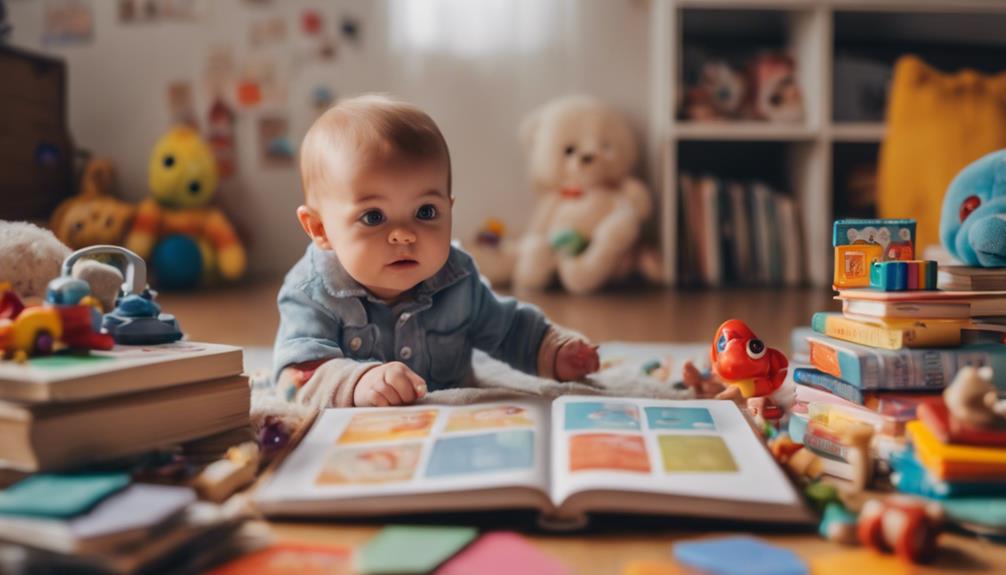
To determine early language proficiency in babies, you can observe their vocalizations and responses to cues as indicators of advanced linguistic abilities.
Babies showing advanced language skills may start vocalizing different sounds as early as 1.61 months old, showcasing their early vocabulary development. Gifted infants might even say their first words earlier than the average age range, demonstrating cognitive-language abilities beyond their peers.
By around 16.8 months old, some advanced toddlers may start forming 3-word sentences, a sign of their early language development and potential for complex interactions.
Additionally, responding to their name and simple commands at an early age can be an indicator of advanced language proficiency in babies. Gifted toddlers often exhibit a larger vocabulary and engage in more complex language interactions, setting them apart with regard to linguistic abilities at a young age.
Memory Retention Abilities

Gifted babies often display remarkable memory retention abilities, easily recalling faces, objects, and experiences well beyond their age. Their advanced memory skills are evident in their capacity to recognize patterns, sequences, and familiar routines from an early age.
If your baby shows a quick memory recall and a knack for retaining new information effortlessly, these could be early signs of their advanced cognitive abilities.
Quick Memory Recall
Babies with exceptional memory retention abilities showcase advanced cognitive skills by recalling information quickly and accurately. This early recognition of familiar faces, objects, or sounds signifies their exceptional memory and potential giftedness. Their rapid learning ability allows them to retain specific details, events, or facts at a young age, demonstrating advanced cognitive development.
Gifted babies often exhibit excellent memory retention abilities, recalling information quickly and accurately.
They can remember specific details, events, or facts at a young age, showcasing advanced cognitive skills.
Babies with exceptional memory retention abilities may demonstrate early recognition of familiar faces, objects, or sounds.
These early signs of advanced cognitive development in babies are vital indicators of their potential giftedness. Their ability to retain information quickly lays a strong foundation for future learning and intellectual growth.
Retaining New Information
Exceptional memory retention abilities in young children can be a strong indicator of advanced cognitive development. Gifted babies often exhibit remarkable accuracy in recalling information beyond their age, retaining details from past experiences with exceptional memory.
These babies show early signs of advanced memory retention by recognizing patterns, sequences, and familiar items. They can retain and recall information quickly, applying it in various situations to showcase their advanced cognitive skills.
Advanced memory retention in babies is evident through their ability to remember faces, objects, and specific events with remarkable accuracy. Parents may observe their gifted babies' ability to retain new information at an impressive pace, allowing them to process and apply information with ease.
Curiosity and Rapid Learning

At a very young age, you may observe a strong curiosity and rapid learning in advanced infants. Gifted babies exhibit a keen interest in exploring and discovering new things. They often display advanced problem-solving skills beyond their peers, showcasing an enthusiasm to learn and an ability to retain information exceptionally well.
Parents may notice their advanced baby's intense focus on specific interests and activities, indicating a capacity for rapid learning and a thirst for knowledge. These early signs of giftedness highlight the child's natural inclination towards exploring the world around them and engaging in activities that stimulate their intellectual growth.
Encouraging this curiosity and providing opportunities for learning through play and interactive experiences can further nurture their advanced abilities and foster a lifelong love for discovery.
Problem-Solving Aptitude
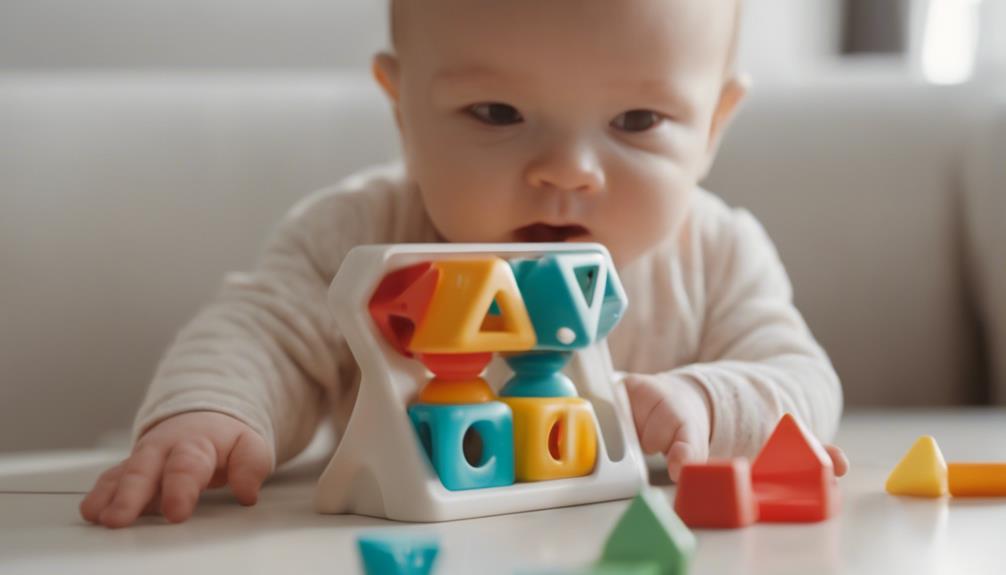
Consider observing the creative problem-solving skills displayed by gifted infants as an indication of their advanced abilities.
Gifted babies show exceptional problem-solving skills by finding creative solutions to challenges. They exhibit strong memory recall and use innovative techniques to overcome obstacles. Advanced problem-solving abilities can be seen in their persistence and unconventional approaches to problem-solving tasks.
Encouraging activities like mini-mazes can help nurture a gifted baby's problem-solving aptitude, allowing them to further develop their skills. By providing opportunities for your baby to engage in problem-solving activities that stimulate their mind, you can support and enhance their natural abilities.
Pay attention to their responses to challenges, as these can give you valuable insights into their problem-solving aptitude and potential for advanced cognitive development. Remember, every baby is unique, and by fostering their problem-solving skills, you're helping them reach their full potential.
Social and Emotional Advancements

To understand if your baby is advanced, observe their social and emotional advancements, which may include displaying intense emotions and forming powerful connections early on. Advanced babies often show signs of emotional intelligence through mature thinking and emotionally intense interactions.
It's essential for parents to understand and respond promptly to their baby's cues to build a strong parent-child bond. Encouraging secure attachment and providing emotional support are vital steps in fostering emotional intelligence in advanced babies.
By observing and nurturing a baby's intense emotions and responses, you can contribute significantly to their overall social and emotional advancements.
Recognize signs of emotional intelligence in your baby.
Build a strong parent-child bond through understanding and prompt responses.
Foster emotional intelligence by providing secure attachment and emotional support.
Creative Thinking and Imagination
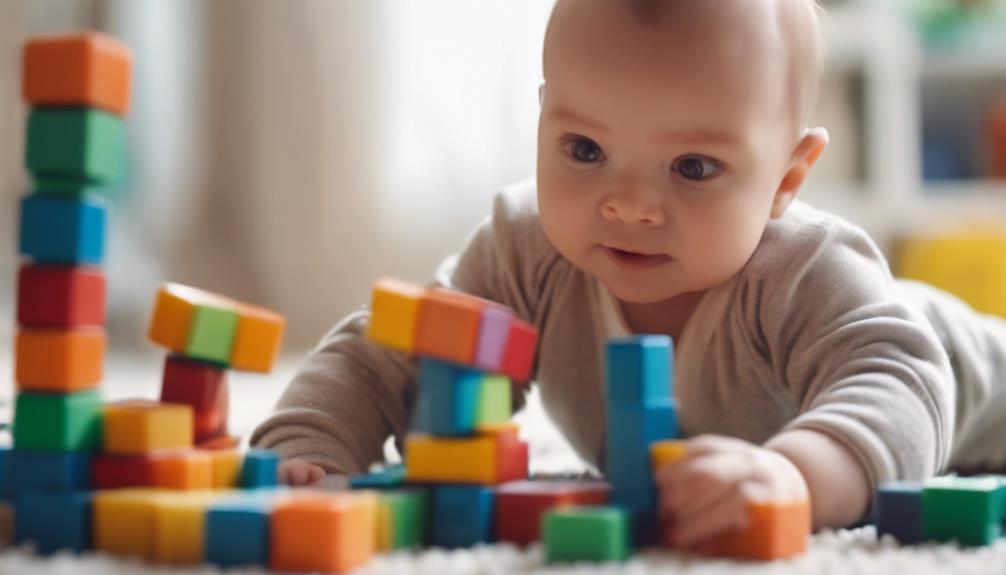
Gifted babies often showcase advanced creative thinking and imaginative skills, engaging in elaborate pretend play and storytelling from a young age. Their exceptional ability allows them to create intricate and imaginative worlds, where they invent complex scenarios and characters, demonstrating their knack for thinking outside the box.
These babies are adept at coming up with innovative solutions to problems, utilizing their creative thinking skills to make connections between concepts that may seem unrelated to others. Gifted children effortlessly generate original ideas, showing a natural talent for nurturing creativity.
As a parent, fostering your baby's imaginative capabilities through play and exploration can further enhance their creative thinking and problem-solving abilities. Encouraging them to express themselves creatively and supporting their imaginative endeavors will help in developing their innovative thinking skills, laying a strong foundation for their future growth and success.
Frequently Asked Questions
How to Tell if a Baby Is Advanced?
To tell if a baby is advanced, observe if they hit milestones early, have exceptional problem-solving skills, show intense curiosity, display strong focus on interests, exhibit advanced communication, language skills, and emotional intelligence.
How to Identify a High IQ Baby?
You notice the spark in their eyes, the way they puzzle through challenges effortlessly. They approach problems differently, with a keen focus that's beyond their years. Your high IQ baby stands out.
How Do I Know if My Child Is Advanced?
You can tell if your child is advanced by watching for early milestones like sitting up alone and observing fine motor skills. Keep an eye on cognitive-language abilities and compare against developmental charts for giftedness indicators.
How Do You Identify How Advanced a Child Is in Their Development?
To identify how advanced a child is in their development, observe milestones like sitting up, grasping objects, and vocalizing. Look for signs of advanced cognitive-language skills, motor abilities, and compare against typical ranges for accurate assessment.
Conclusion
To sum up, identifying if your baby is advanced involves observing a range of developmental milestones. Just like a gardener tending to a budding flower, nurturing your child's unique abilities can help them blossom and thrive.
Keep a watchful eye on their progress, encourage their curiosity, and provide opportunities for growth. Remember, every child is different, and celebrating their individual strengths will help them reach their full potential.
Trust your instincts and enjoy the journey of discovery with your little one.


